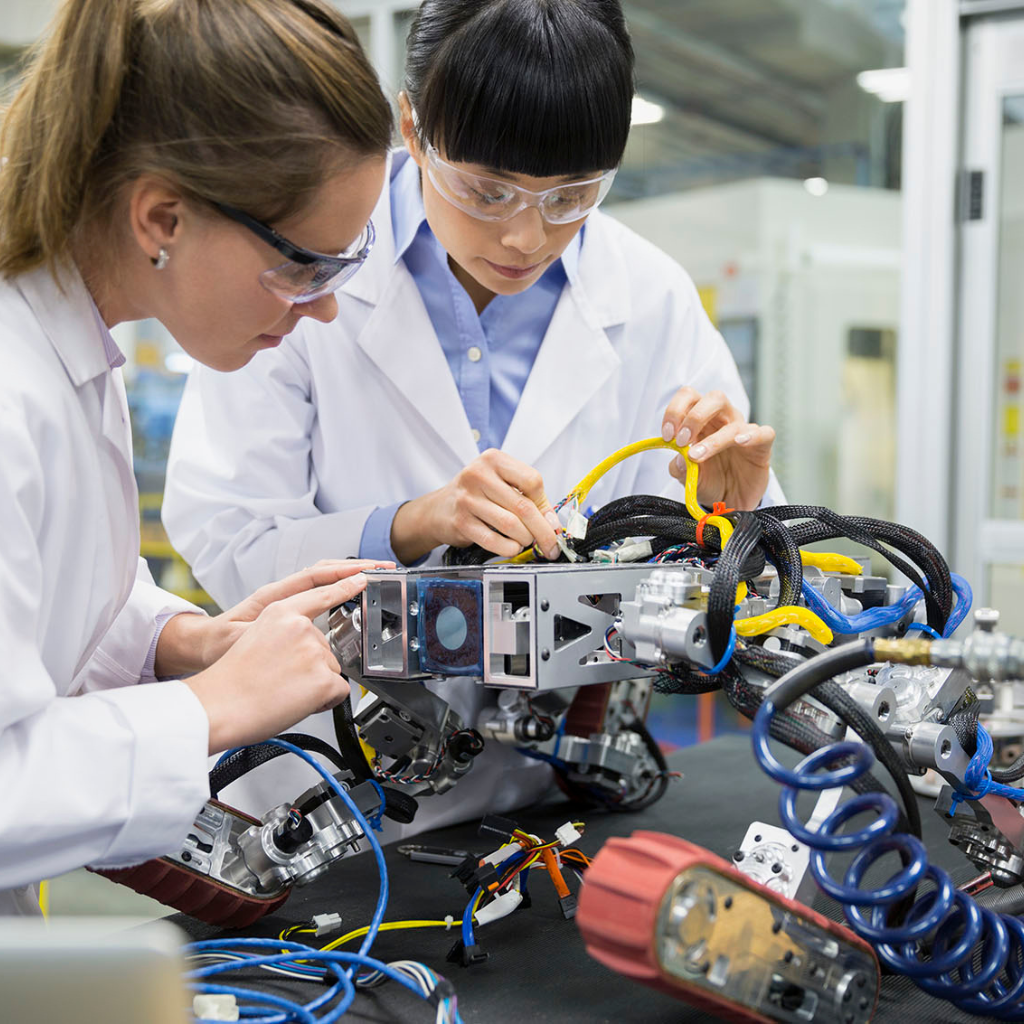Mechanical engineering is one of the oldest and broadest fields of engineering, rooted in the principles of physics, mathematics, and materials science. At its core, it involves designing, analyzing, manufacturing, and maintaining mechanical systems that power our daily lives. From the engines that drive our vehicles to the heating, ventilation, and air conditioning (HVAC) systems that regulate indoor climates, mechanical engineering plays an indispensable role in shaping the modern world.
This discipline stands out not only for its versatility but also for its profound impact on a wide range of industries. Mechanical engineers contribute to advancements in sectors such as automotive, aerospace, energy, robotics, healthcare, and manufacturing. Whether it’s designing cutting-edge robots or developing sustainable energy solutions, mechanical engineers are at the forefront of technological innovation.
In today’s rapidly evolving world, the importance of mechanical engineering cannot be overstated. As global challenges like climate change and resource scarcity intensify, the demand for mechanical engineers to create efficient, sustainable, and innovative solutions continues to grow. Mechanical engineering isn’t just about machines and mechanisms—it’s about solving problems, improving lives, and pushing the boundaries of what’s possible.
What is a Mechanical Engineer?
A mechanical engineer is a professional who applies principles of physics, mathematics, and materials science to design, analyze, and maintain mechanical systems. Mechanical engineering, as a discipline, serves as the backbone of modern technology, dealing with anything that involves movement, energy, or force. From intricate microdevices to massive industrial machines, mechanical engineers are responsible for ensuring the efficiency, reliability, and safety of countless systems and processes.
At its essence, mechanical engineering is about problem-solving. It combines creativity and analytical skills to create solutions that improve functionality, reduce costs, and enhance sustainability. The field encompasses diverse applications, including designing engines, optimizing manufacturing processes, and developing innovative technologies like robotics and renewable energy systems.
Mechanical engineers play versatile roles across various industries:
- Automotive Industry: They design and test vehicle components, such as engines, transmissions, and braking systems, ensuring safety and performance.
- Aerospace Sector: They contribute to the development of aircraft, spacecraft, and satellites, focusing on aerodynamics, propulsion, and structural integrity.
- Energy Sector: Mechanical engineers develop power generation systems, including turbines, solar panels, and wind turbines, to meet the growing demand for sustainable energy.
- Manufacturing: They oversee production processes, improve efficiency, and ensure that machinery operates smoothly.
- Healthcare: Mechanical engineers design medical devices like prosthetics, imaging equipment, and surgical robots that improve patient care.
- Robotics and Automation: They create robotic systems and automated machines for applications ranging from industrial production to household use.
In addition to their technical responsibilities, mechanical engineers often collaborate with multidisciplinary teams, communicate ideas effectively, and manage projects. They serve as problem-solvers, innovators, and leaders, driving progress in virtually every sector. This versatility makes mechanical engineering one of the most impactful and sought-after professions in the world.
Educational Requirements
Becoming a mechanical engineer requires a strong educational foundation that combines theoretical knowledge with practical application. Aspiring engineers must complete specific academic milestones to acquire the skills and qualifications necessary for the profession.
- Degrees Needed
- Bachelor’s Degree: A bachelor’s degree in mechanical engineering or a closely related field is the minimum requirement to enter the profession. Most programs are four years long and provide a comprehensive education in the fundamentals of mechanical engineering.
- Master’s Degree (Optional): For those looking to specialize in advanced areas such as robotics, energy systems, or biomechanics, a master’s degree can be highly beneficial. It is also valuable for pursuing research roles or higher-level positions in academia or industry.
- Doctoral Degree (Optional): For individuals aiming for careers in research, development, or teaching at the university level, earning a Ph.D. is often essential.
- Key Subjects Studied
Mechanical engineering programs are built around a core set of subjects that equip students with the knowledge needed to solve complex engineering problems:
- Mathematics: Courses in calculus, linear algebra, and differential equations provide the analytical tools required for modeling and problem-solving.
- Physics: Understanding the principles of mechanics, energy, and motion is crucial for designing and analyzing systems.
- Thermodynamics: This field focuses on heat transfer, energy systems, and the laws governing energy conversion processes.
- Mechanics of Materials: Students learn about stress, strain, and the behavior of materials under different forces.
- Fluid Mechanics: This subject explores the behavior of liquids and gases, essential for designing systems like pumps, turbines, and HVAC systems.
- Computer-Aided Design (CAD): Proficiency in CAD software is vital for creating detailed models and simulations of mechanical systems.
- The Importance of Practical Experience
While classroom learning provides the theoretical foundation, hands-on experience is equally critical for aspiring mechanical engineers. Practical exposure bridges the gap between theory and real-world application:
- Internships: Internships offer students the chance to work in industry settings, exposing them to real projects, team collaboration, and problem-solving scenarios. This experience is invaluable for building skills and making industry connections.
- Laboratory Work: Many academic programs incorporate lab sessions where students experiment with materials, mechanics, and systems to understand engineering concepts better.
- Capstone Projects: These senior-year projects challenge students to apply their knowledge to solve a real-world problem, often in collaboration with industry sponsors.
- Cooperative Education (Co-op) Programs: Some universities offer co-op programs, allowing students to alternate between academic study and paid work experience in engineering roles.
Practical experience not only enhances technical skills but also prepares students to navigate the challenges of working in diverse industries. A strong educational background, coupled with hands-on training, forms the cornerstone of a successful career in mechanical engineering.
Skills Needed to Succeed
A career in mechanical engineering demands a unique blend of technical expertise, analytical prowess, and interpersonal skills. To excel in this dynamic field, engineers must master a diverse set of competencies that go beyond theoretical knowledge and classroom learning.
- Technical Skills
Technical proficiency is at the heart of mechanical engineering. Engineers must be adept at using specialized tools and knowledge to design, analyze, and improve systems. Key technical skills include:
- Computer-Aided Design (CAD): Proficiency in CAD software, such as SolidWorks, AutoCAD, or CATIA, is essential for creating detailed 2D and 3D models of mechanical systems.
- Simulation and Analysis Tools: Familiarity with software like ANSYS or MATLAB enables engineers to simulate performance, analyze stress, and optimize designs before manufacturing.
- Materials Science: Understanding the properties, strengths, and limitations of various materials helps engineers choose the right materials for specific applications.
- Thermodynamics and Fluid Dynamics: Practical knowledge in these areas is crucial for designing efficient energy systems, engines, and HVAC systems.
- Programming and Automation: Skills in programming languages (e.g., Python, C++) and automation technologies are increasingly important in areas like robotics and manufacturing.
- Problem-Solving and Critical Thinking
Mechanical engineers often face complex, open-ended problems that require innovative solutions. They must:
- Analyze Problems Systematically: Breaking down issues into smaller, manageable components allows engineers to identify root causes and develop effective solutions.
- Think Creatively: Innovation is key to designing systems that are more efficient, cost-effective, or sustainable.
- Adapt to Challenges: Engineers must stay resilient and adaptable, particularly when projects face unexpected hurdles or constraints.
- Communication and Teamwork Abilities
Mechanical engineering is rarely a solo endeavor. Success often depends on effective collaboration and clear communication:
- Team Collaboration: Engineers work in multidisciplinary teams, often alongside electrical engineers, software developers, and project managers. Understanding how to contribute and coordinate in a team setting is vital.
- Clear Communication: Explaining complex technical concepts to non-engineers, such as clients or stakeholders, requires clarity and precision. Strong written and verbal communication skills are essential for presenting findings, drafting reports, and creating project documentation.
- Project Management: Engineers frequently lead projects, requiring them to manage timelines, allocate resources, and balance competing priorities.
Mastering these skills ensures that mechanical engineers not only meet technical challenges but also thrive in collaborative, fast-paced environments. Combining technical expertise with soft skills allows engineers to innovate effectively, solve problems efficiently, and contribute meaningfully to their teams and projects.
Certifications and Licensure
Certifications and licensure play a crucial role in the professional development of mechanical engineers. They validate expertise, enhance credibility, and open doors to advanced career opportunities. While not always mandatory, obtaining relevant certifications can significantly impact an engineer’s career trajectory.
- Importance of Professional Certifications
Professional certifications demonstrate an engineer’s commitment to excellence, ongoing learning, and adherence to industry standards. Key benefits include:
- Enhanced Credibility: Certifications, such as the Professional Engineer (PE) license, establish trust and professionalism in the eyes of employers, clients, and colleagues.
- Broader Career Opportunities: Many roles, especially those involving leadership, project management, or public safety, require certified professionals.
- Competitive Edge: Certified engineers often stand out in the job market, increasing their chances of securing high-responsibility positions.
- Global Recognition: Certifications are universally recognized, enabling engineers to pursue opportunities in different countries.
- Requirements for Licensure
The PE (Professional Engineer) license is one of the most recognized certifications in mechanical engineering. The process to earn it typically involves the following steps:
- Education: A bachelor’s degree in mechanical engineering from an accredited program is required.
- Fundamentals of Engineering (FE) Exam: This is the first step toward licensure and is usually taken during or shortly after graduation. Passing this exam earns the designation of Engineer-in-Training (EIT) or Engineering Intern (EI).
- Work Experience: Engineers must gain relevant professional experience, typically four years, under the supervision of a licensed PE.
- PE Exam: After gaining sufficient experience, candidates take the PE exam, which tests advanced knowledge and application in mechanical engineering. Upon passing, they become licensed Professional Engineers.
Additional certifications, such as those offered by the American Society of Mechanical Engineers (ASME) or specialized areas like HVAC, robotics, or energy systems, further enhance expertise and career prospects.
- How Certification Impacts Career Growth
Certification can be a game-changer in a mechanical engineer’s career:
- Leadership Roles: Licensed engineers are often preferred for supervisory positions, as they are trusted to oversee projects that impact public safety and compliance.
- Higher Salaries: Certification often correlates with higher earnings, as it signifies advanced qualifications and a commitment to the field.
- Expanded Scope of Work: Licensed engineers can sign off on projects, take legal responsibility for designs, and work independently on public and government contracts.
- Specialization Opportunities: Certifications in niche areas, such as energy efficiency or advanced manufacturing, allow engineers to carve out specialized career paths.
In a competitive industry like mechanical engineering, certifications and licensure provide a vital edge, offering proof of competence and a pathway to greater career success. Aspiring mechanical engineers should prioritize certifications as a long-term investment in their professional growth.
The Role of Experience
In mechanical engineering, hands-on experience is as valuable as academic knowledge. Practical exposure not only hones technical skills but also equips engineers to navigate real-world challenges. From entry-level jobs to lifelong learning, experience plays a pivotal role in shaping a mechanical engineer’s career.
- How Hands-On Experience Shapes a Mechanical Engineer
Practical experience bridges the gap between theoretical knowledge and real-world application. It allows engineers to:
- Apply Concepts in Real Scenarios: Experience provides engineers with opportunities to implement classroom theories, such as stress analysis or fluid dynamics, in actual projects.
- Develop Problem-Solving Skills: By tackling real-world challenges, engineers learn to devise innovative solutions, improve processes, and enhance system efficiency.
- Understand Industry Practices: Exposure to industry standards, tools, and workflows prepares engineers for the demands of professional environments.
- Build Confidence: Working on diverse projects builds confidence in decision-making and technical competence, crucial for career growth.
- Types of Entry-Level Jobs and Growth Opportunities
Most mechanical engineers begin their careers in roles that emphasize learning and skill development. Common entry-level positions include:
- Design Engineer: Focuses on creating and refining mechanical systems or components using CAD software.
- Manufacturing Engineer: Works on optimizing manufacturing processes to improve efficiency, reduce costs, and maintain quality.
- Testing and Quality Assurance Engineer: Involves evaluating product performance, identifying defects, and ensuring compliance with specifications.
- Field Engineer: Provides on-site support, troubleshooting, and maintenance for mechanical systems.
These roles lay the groundwork for progression into advanced positions, such as:
- Project Manager: Oversees large-scale engineering projects, ensuring timely completion and budget adherence.
- Research and Development Engineer: Focuses on innovation, designing cutting-edge technologies or improving existing ones.
- Specialized Roles: Engineers can specialize in areas like robotics, renewable energy, or aerospace, carving out niche career paths.
- Importance of Continuing Education and Staying Updated
The field of mechanical engineering evolves rapidly, driven by advancements in technology and industry demands. Engineers must commit to lifelong learning to remain relevant and competitive.
- Staying Current with Trends: Regularly updating knowledge about emerging technologies, such as additive manufacturing, automation, or sustainable design, is essential.
- Pursuing Advanced Certifications: Specialized certifications in areas like Six Sigma, finite element analysis (FEA), or energy systems can enhance expertise and career opportunities.
- Engaging in Professional Development: Attending workshops, conferences, and seminars helps engineers network and learn from industry leaders.
- Learning New Tools: Familiarity with the latest software and tools, such as artificial intelligence or IoT applications in engineering, keeps professionals ahead of the curve.
Experience, combined with a commitment to continuous learning, is the cornerstone of a successful career in mechanical engineering. Each project, role, and new skill contributes to the professional growth and adaptability required to excel in this ever-evolving field.
Common Career Paths in Mechanical Engineering
Mechanical engineering offers a diverse array of career opportunities across industries and specializations. This flexibility allows engineers to align their careers with their interests and expertise.
- Different Industries
Mechanical engineers play vital roles in various sectors:
- Automotive: Designing and improving vehicles, from traditional combustion engines to cutting-edge electric and autonomous cars.
- Aerospace: Developing aircraft, spacecraft, and advanced propulsion systems, including work in defense and space exploration.
- Energy: Contributing to renewable energy solutions like wind turbines and solar systems, as well as optimizing traditional power plants.
- Manufacturing: Improving production processes, implementing automation, and ensuring high-quality output in factories.
- Specializations
As technology evolves, many mechanical engineers choose to specialize in specific fields:
- Robotics: Designing automated systems and robots for applications in industries like healthcare, manufacturing, and logistics.
- HVAC (Heating, Ventilation, and Air Conditioning): Developing systems that ensure optimal environmental comfort and energy efficiency.
- Biomechanics: Applying engineering principles to medical devices, prosthetics, and other healthcare technologies.
- Mechatronics: Combining mechanical, electrical, and computer engineering to create innovative systems like smart machines and IoT devices.
- Career Growth and Advancement Opportunities
Mechanical engineers can progress to higher positions as they gain experience and expertise:
- Project Leadership: Managing complex engineering projects and leading teams to achieve objectives.
- Research and Development: Innovating new technologies or improving existing products and systems.
- Executive Roles: Advancing to positions like Chief Engineer or Director of Engineering.
- Entrepreneurship: Starting their own companies or consultancy services in specialized areas.
Challenges in the Profession
Mechanical engineering, while rewarding, is not without its obstacles. Identifying and overcoming these challenges is essential for long-term success.
- Common Obstacles Mechanical Engineers Face
- Technical Complexity: Working on intricate systems that require precise calculations and innovative problem-solving.
- Time and Budget Constraints: Balancing quality, cost, and deadlines can be demanding.
- Keeping Up with Technology: Rapid advancements in technology can make existing skills obsolete.
- Work-Life Balance: High-pressure projects and tight schedules may impact personal time.
- How to Overcome These Challenges
- Continuous Learning: Staying updated with industry trends and new tools helps engineers stay competitive.
- Effective Time Management: Prioritizing tasks and using project management tools can help meet deadlines.
- Collaboration: Leveraging team expertise ensures better solutions to complex problems.
- Resilience: Developing mental toughness and adaptability is crucial for navigating setbacks and high-stress situations.
Future Trends in Mechanical Engineering
The mechanical engineering landscape is rapidly evolving, driven by advancements in technology and shifting industry needs.
- Advancements in Technology
- Artificial Intelligence (AI): AI-powered design and simulation tools are streamlining the engineering process.
- Automation: The rise of smart factories and autonomous systems is transforming manufacturing and logistics.
- 3D Printing (Additive Manufacturing): Revolutionizing prototyping and production by enabling faster, more cost-effective manufacturing processes.
- How the Industry is Evolving
- Sustainability: A growing emphasis on green technologies and eco-friendly practices is reshaping product design and manufacturing.
- Interdisciplinary Work: Collaboration with fields like data science and software engineering is becoming increasingly common.
- Customization: Demand for personalized and adaptable systems is influencing product development.
- Skills Needed to Stay Relevant in the Future
- Adaptability: Engineers must embrace change and adopt new tools and methodologies.
- Data Analysis: Proficiency in analyzing and interpreting data from simulations and real-world systems is becoming essential.
- Cross-Disciplinary Knowledge: Combining mechanical engineering expertise with knowledge in fields like electronics, software, or materials science will be key.
- Soft Skills: Communication, teamwork, and project management will remain critical as engineers work in increasingly collaborative and global environments.
By understanding career paths, addressing challenges, and anticipating future trends, aspiring and current mechanical engineers can position themselves for success in this exciting and ever-changing field.
Read more: What are the best areas to outsource in a business?
Conclusion
Becoming a successful mechanical engineer requires a blend of education, skills, experience, and a commitment to continuous learning. This dynamic profession offers diverse opportunities across industries, from automotive and aerospace to renewable energy and robotics. With the right qualifications and mindset, mechanical engineers play a crucial role in shaping the technologies and systems that drive progress in today’s world.
While the journey may be challenging, the rewards are equally fulfilling. Overcoming obstacles, staying updated with emerging trends, and embracing lifelong learning are vital to excelling in this field. As the industry evolves with advancements like AI, automation, and sustainable practices, mechanical engineers remain at the forefront of innovation, solving problems, and creating solutions that impact society.















